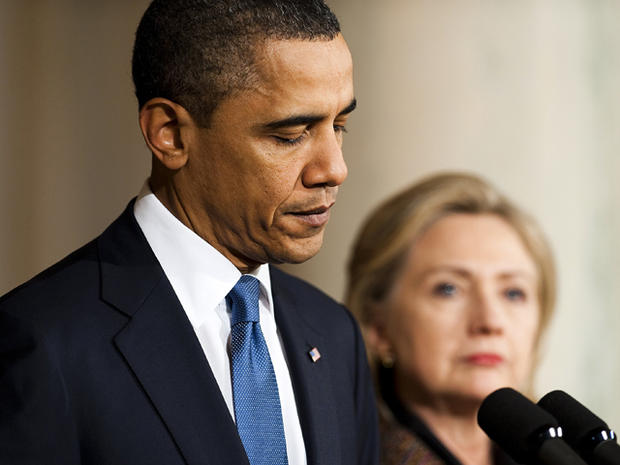What's next for the U.S. if Qaddafi stays in Libya?
As President Obama says it, the U.S. military mission in Libya will be "limited" and is only happening to support an "international coalition" under a United Nations "mandate" to protect the civilian population of Libya from attack by a brutal dictator.
Yesterday, he said that the mission is already working because it prevented a "catastrophe" and the "atrocities" that could have occurred had the Qaddafi regime's forces successfully attacked the rebel stronghold of Benghazi enforcing Qaddafi's decree to "show no mercy" to the opposition.
Complete coverage: Anger in the Arab World
How will the Middle East dominoes fall now?
So the primary stated goal of the military campaign is use the "extraordinary capabilities" of the U.S. to create the space necessary for an international coalition to enforce a no-fly-zone and ceasefire in Libya.
Period.
But, the United States has also offered another stated goal, which is regime change in Libya. Unlike the first goal, though, the White House isn't pledging any military action to reach it.
So to repeat, the 200+ missions flown by U.S. aircraft along with the more than 160 Tomahawk cruise missiles fired by U.S. and British ships are aimed only to remove the air defenses of Libya and to prevent the Qaddafi regime from carrying out attacks on its own citizens.
And to repeat, to hear the White House say it, none of those missions was carried out to force regime change in Libya.
So what is the U.S. doing to foster regime change? Well, the U.S. government has frozen the assets of the Qaddafi regime, pushed for strong sanctions, and is putting strong pressures diplomatically on the regime. The big question for the White House going forward, as the initial military operations conclude in "days, not weeks" and the command and control of the operation is handed over to the international coalition, is: What happens next?
Qaddafi defiant as rebel standoff continues
U.S. still looking to cede control of Libya mission
Cost for U.S. in Libya races towards $1B mark
What happens if Qaddafi doesn't leave? What happens if he continues to attack his own people? And what happens if the millions of Libyans loyal to Qaddafi fight back against the rebel opposition and against the coalition forces who've basically been giving them protection?
In other words, how does this end?
The White House is, on the one hand, pushing the notion that the military operation is short term, limited and targeted. On the other hand, regime change is a goal with no real action behind it and one that could be a long time coming.
"As we've said repeatedly, that the effort of our military operation is not regime change," said Ben Rhodes, President Obama's Deputy National Security Advisor. "It's the Libyan people who are going to make their determinations about the future. We support their aspirations, their democratic aspirations, and have stated that Gaddafi should go because he's lost their confidence," he said.
This dichotomy is the big issue faced by the White House. Up to now, the administration has meticulously explained the American effort in Libya as being part of an international effort, to prevent the U.S. from being seen as leading yet another war against a Muslim country. But like Iraq and Afghanistan, there is not necessarily an easy exit strategy in Libya. And the White House, rightly so, may not have all the answers as to what happens next.
